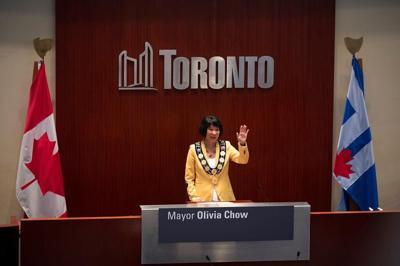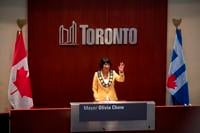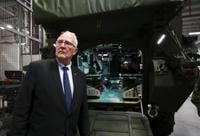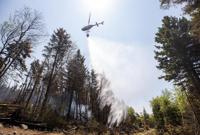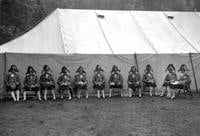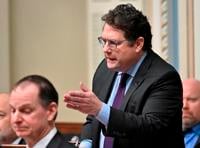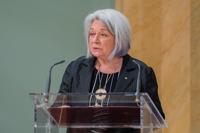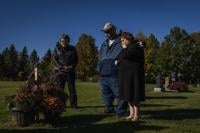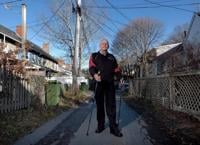TORONTO - Olivia Chow placed Toronto's asylum seeker shelter crisis at the top of the agenda on Wednesday, securing unanimous approval on a motion to tackle the issue during her first city council meeting as mayor.
Chow billed the motion as the first concrete steps taken under her leadership to open up shelter spaces for asylum seekers and move more people to permanent housing.
"This is a down payment. It's a beginning," Chow, who was elected in a byelection last month, said during Wednesday's city council meeting.
The motion – Chow's first as mayor – directs staff to immediately open up 150 shelter spaces for refugee claimants, primarily by renewing shelter hotel contracts, and to find 100 more spaces in the coming days.
Chow indicated support for those spaces would in part come from the $97 million in federal funding earmarked for Toronto on Tuesday to help shelter asylum claimants.
Chow and Ontario Premier Doug Ford welcomed Ottawa's funding announcement but said it still fell short of the $157 million the city needed to help shelter the roughly 3,000 asylum claimants who make up about a third of Toronto's shelter capacity.
"We are calling on the federal government to build on its stop-gap funding by fully funding the supports needed to shelter and care for these refugees and asylum seekers in the city," Ford and Chow wrote in a joint statement Wednesday.
In a statement emailed to ´şÉ«Ö±˛Ąon Wednesday, the office of the federal immigration minister said housing for asylum seekers is the responsibility of provinces and municipalities, but "the urgency of the situation requires an all-hands-on-deck approach, and the federal government has been there every step of the way."
In addition to the newly announced federal funding to help provide shelter for asylum claimants, Immigration, Refugees and Citizenship Canada (IRCC) has also been working with provinces and municipalities to provide temporary housing, such as lodging in hotel rooms, the statement said. It also noted that Ottawa has been working to expedite asylum seekers' work permit applications so they can support themselves and their families.
Chow made the issue of sheltering refugee claimants and asylum seekers a focus of her first week in office, holding meetings with senior officials across levels of governments and lobbying for additional support.
The issue took on elevated urgency as some claimants were left to sleep on city sidewalks outside a homeless support centre in recent days as different levels of government wrangled over funding, while frontline advocates and community groups stepped in with support.
A controversial city policy, brought in under Deputy Mayor Jennifer McKelvie before Chow was elected, has seen asylum claimants looking for a spot in non-refugee-specific Toronto shelters directed toward federal programs.
Chow's motion, seconded by McKelvie, included a line that everyone, regardless of immigration status, would be able to access the city's shelter system "as space becomes available."
"This is just the first step of many to come," McKelvie said Wednesday. "We want to be a home that welcomes refugees, we want to be a Toronto for everyone, but we need support to do that."
Chow's motion also saw council approve a one-time $6.67-million top up to a rental housing subsidy program, matched by the provincial government.
In the joint statement Wednesday, Ford and Chow said the combined funding would immediately provide permanent housing to upwards of 1,350 households.
They called on the federal government to step up with another $26.7 million for the program, saying historically the federal government funds two-thirds of the program.
"We must do more and do more quickly to fix this crisis. We urgently call on the federal government to join us in supporting these vulnerable newcomers," the joint statement read.
The motion approved by council Wednesday includes a number of other measures, including a direction to city staff to develop an outreach strategy to pair refugee claimants eligible for the subsidy with property owners with suitable rental accommodations.
It also gives city staff the authority to enter into agreements to help establish a federally funded reception centre for refugee claimants arriving at Toronto's Pearson International Airport.
Chow says agencies have pushed her to advocate for a centralized location where refugees can connect with service providers as soon as they reach Toronto.
This report by ´şÉ«Ö±˛Ąwas first published July 19, 2023.

